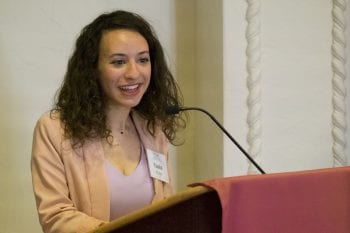2017 Civic Scholar Yaala Muller reflects on what she has learned over the past four years at WashU, and the Gephardt Institute’s role in that process.

As I reflect on my experience at Washington University and with the Gephardt Institute, a question continues to buzz around in my head: the question of what gives me hope.
I recently re-read the essay I submitted when applying to WashU. I wrote about my experience with the conflict in Israel and Palestine. It is something I have thought about and questioned almost every day of my life as an Israeli immigrant. In the essay, I reflected on the hopelessness I often felt and how I attempted to make sense of it.
During my first year at WashU, I developed a strong fascination for Irish literature. There was something about the writing that felt like home to me. It was complex and fraught with conflict about national identity, and it set a vision for finding the stuff of life in the mundane. I particularly loved the writings of James Joyce. It was when I read Dubliners, a collection of Joyce’s short stories, that I came across the concept of paralysis: the inability to act.
This was the word I had been looking for. Joyce often referred to paralysis in the context of Ireland, but I knew it in the context of violence in Israel and Palestine. Learning this word was important to me because I could finally name the ephemeral feeling I carried. Since then, the word has come up multiple times; personal paralysis, institutional paralysis, and the paralysis many of us felt and continue to feel after last November’s Election Day. What happens when we are unable to act? What gives us hope? What helps set mobilization in motion?
These were some of the questions that propelled me to apply for the Gephardt Institute’s Civic Scholar Program. Having a reflective space with my Civic Scholars cohort has enabled me to openly discuss some of these questions. We’ve explored the relationship between love and money, the nuances of majority rule and influence of the minority in a democracy, and the big ideas we have to make the world a better place. The Gephardt Institute has given me countless opportunities. It has also introduced me to several of my best friends.
When I confront the stuff of life with these friends, I am often caught off-guard by the feeling in my chest. Amid the paralysis, I feel a sense of hope, because I know that the people around me are invested in developing a more just, equitable, sustainable, and healthy world. In Dubliners, out of the paralysis of each story there emerges an epiphany, or what Joyce describes as the moment when “things or characters revealed their true character or essence.” It is these small moments of epiphany, where I witness my friends’ unabashed essence – their deep kindness, brilliant minds, and profound love for others – manifest, that give me hope. In the age of alternative facts and post-truth, these moments are what I hold on to.
If we work hard, and dedicate ourselves to others, it may not feel like the world is changed for good, but we may find the greater good in a moment. And sometimes, all we need is a moment to bring us out of paralysis. The Gephardt Institute and Civic Scholars Program have taught me that we can do nothing alone. We need each other to work through the paralysis and deepen our hope in what’s to come.